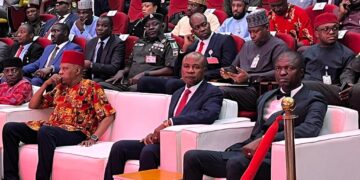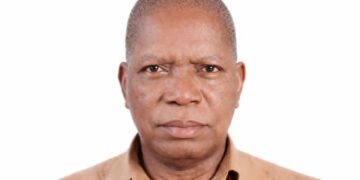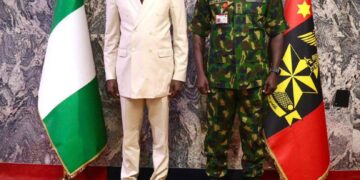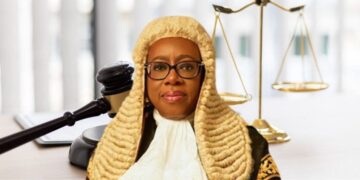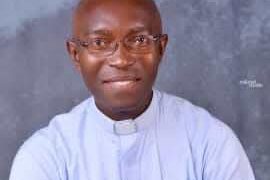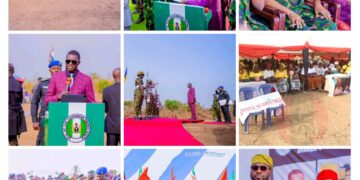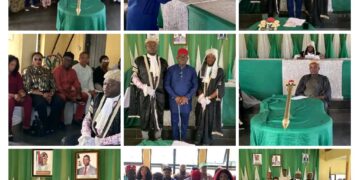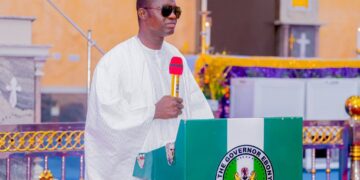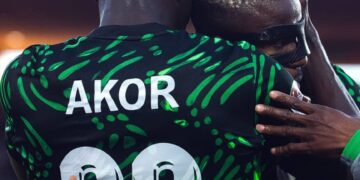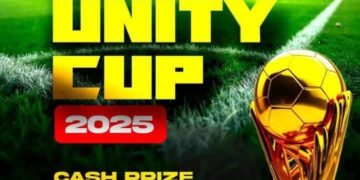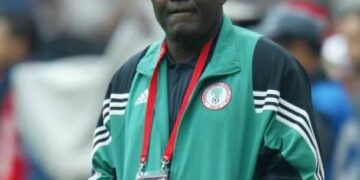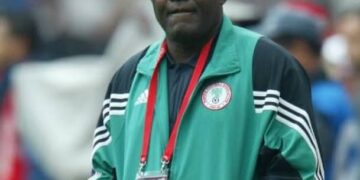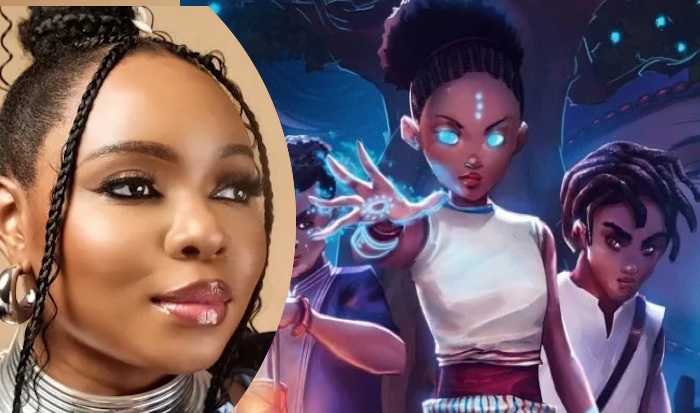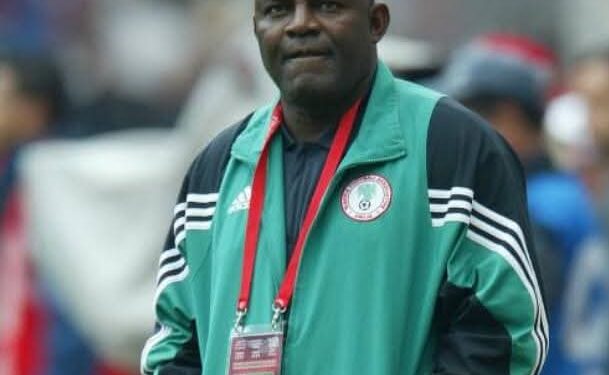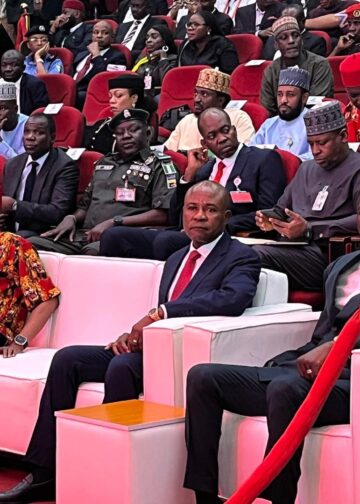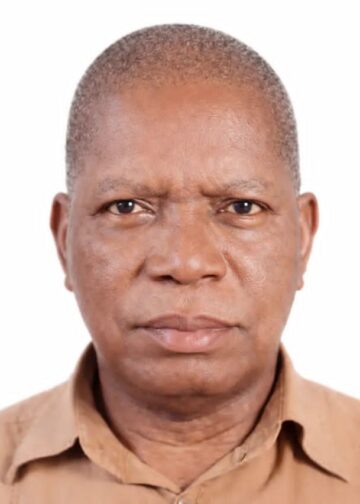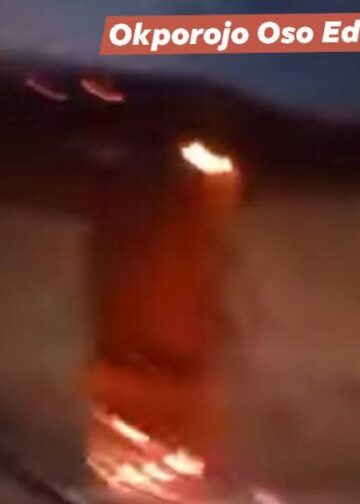By Okpani Nkama (Jnr)
It was the all-time great English poet and playwright, William Shakespeare, who stated; “When beggars die there are no comets and stars seen: The heavens themselves blaze forth the death of princes.”
On July 03, 2025, the heavens of the European world came blazing forth with the death of a young prince of European football, the 28 year old Portuguese born Liverpool forward, Diogo Jota.
From England, where he proved a prolific goal banger, playing for Liverpool FC, to Lisbon, Portugal, his home country he made proud also as a utility goal merchant of the Portuguese national team, rivers of tears of agony came flowing, watering bumper harvests of wreaths of flowers of honour.
These, of course, are symbolic of their profound appreciation of the great service and joy Jota brought to Portugal, nay, Europe, and the world through his superlative skills as a footballer.
Since football has firmly established globally as a universal sporting passion of all nations, the untimely death of the vivacious forward thus translated to a global tragedy. Hence, lovers of football worldwide mourned with Europe. Expectedly, the Europeans spared nothing in making a global show of their honour, love, and appreciation of Diogo’s contributions to the glory of European soccer at club and national levels.
But here in Africa, our football heavens hardly blaze forth the deaths of our own soccer heroes? In July alone, Africa lost two football greats from the continents largest single black nation, Nigeria.
Peter Jaja Rufai, aka Dodo Mayana, the Super Eagles former goalkeeper, died at age 61 in the early hours of that same July 03, 2025, Diogo Jota was crashing and dying with his younger brother, Andre Sylver in Spain.
Also, Monday Sinclair aka double man, who played for the nation in the 1960s and coached the Super Eagles in 1997, Sharks FC, of Port Harcourt, Rangers International FC of Enugu, and other clubs, died at age 88 on July 17, 2025. Both have joined Christian Chukwuemaka Chukwu, the all-time great Green Eagles Captain and Super Eagles coach, who died earlier on April 12, 2025, at age 74.
Why are there no stars and comets seen in the African heavens for Chukwu, Sinclair, and Rufai as we have seen for Jota in Europe?
Why the ominous silence in our clime while the Europeans are agog for their own? This is even when the highly celebrated Jota by the Europeans was just a mere rookie in international football compared to these fallen heroes of ours. Even the youngest of these fallen trio, Peter Rufai, who was the face of the iron bar goalposts of the golden generation of Nigeria’s dreaded Super Eagles of the 1990s, measures far above Jota. In fact, all the years Jota lived on earth is not up to the playing years of Rufai, who graced the European soccer fields, including that of Portugal, Jota’s home country, before he was born.
Well, the poignant reality here is that the blazing of the European heavens for young Diogo is a pattern and a tradition. On the other hand, that the Nigerian heavens are not blazing forth such magnificent honours, and the celebration of Chukwu, Rufai, and Sinclair is equally a pattern. Our hypocrisy and lip service to our heroes constitute not only an ugly tradition, it’s essentially the water mark of this inherent thing called negritude of the African folks. While the oyibo values skills and talents and goes for the substance of life, Africans cherish and chase shadows. We have little or no values for our skilled and talented folks. Hence, we neglect and obliterate them.
Zooming in on the main subject of this piece, CHRISTIAN CHUKWUEMAKA CHUKWU. This negritude is essentially why the Nigerian, nay, African Football heavens seems to be blinking instead of blazing forth his passage? He was one of Nigeria’s and indeed Africa’s finest soccer maestros whose generation played for the love of the game and honour for the continent and Fatherland. Chukwu and the generation before him played out their hearts before playing football became a mega money-making venture.
In his strings of honour for the nation, Chairman-Chukwu was the first Nigerian national skipper to lift the AFCON trophy. This was when he captained the Nigerian Green Eagles to a scintillating victory in the 12th edition of the African Cup of Nations hosted and won by Nigeria in Lagos, in 1980. He was also an assistant coach under Clemens Westerhof when Nigeria won the 1994 AFCON in Tunisia. Together with Westahof, they took the rollicking golden generation of the Super Eagles to the 1994 World Cup fiesta in the USA. Chukwu was also the assistant coach under Sebastian Broderick-Imasuen, who led the Nigerian U-16 team, the Golden Eaglets, to win the first ever FIFA U-16 World Cup tournament in China in 1985.
Three years earlier, in 1982, when Chukwu retired from playing active football, he returned to his home club, Rangers International FC of Enugu, as coach. He led them to a Challenge Cup triumph in 1983. It was from the Rangers assignment that he was called up to serve at the national stage as Assistant manager of the newly formed U – 16 National team in 1985. He returned to Rangers in 1986 and led the team to spates of victory till 1988.
Chukwu left again, this time going beyond the shores of the land for international coaching experience. He landed in Kenya in October 1998 to manage the Harambee Stars, the Kenyan national team as head coach. He left Kenya in 2002 and had a brief stay in Lebanon to coach a frontline Lebanese Club, the Safa FC. From Lebanon, he was called back home to take charge of the Super Eagles as head coach. Chukwu held sway for two years 2003 -2005 and led Nigeria to another AFCON outing in Tunisia – 2004. This time, Nigeria settled for the Bronze finishing in the third place. Done with the national team assignment, Chukwu returned as head coach of Rangers International FC in 2005 and led Rangers up to 2009 with chequered impact. He was later appointed General Manager and CEO of Rangers.
That he didn’t feature in the FIFA World Cup stages as a player was because Nigeria hadn’t qualified for the fiesta in his playing days. Nevertheless, Chukwu stood to be counted globally among elite soccer icons who transitioned from players and captains of their national teams to Coaches. There were others before and after him, but he was in the hue of
Brazilian Mario Zagallo, who was the first to win the World Cup as a player in 1958 and 1962 and led Brazil as coach to win the Jules Rimet World Cup trophy for keeps in 1970.
Other names in his hue are Hendrik Johan Cruyff, aka Flying Dutch Man,_ who led the Netherlands as Captain to the World Cup fiesta in West Germany, 1974. Franz Anton Beckenbauer of Germany, aka _Der Keisar (Emperor). The legendary German defender captained West Germany to victory in the 1974 World Cup and later led the famous German Machine to the same title in the Italia 1990 Fiesta.
Franklin Edmundo Rijkaard. Dreadlocks wearing Rijkaard with Ruud Gullit and Marco Van Basten in AC Milan, formed the famous Dutch Trio, ranked the most dreaded triumvirate ever in history to grace the football pitches of the late 1980s and early 1990s. Rijkaard played in the 1990/1994 World Cup finals and also managed the Netherlands national team in his stride as a coach.
It may interest you to know that among the elite club of player-coaches, the German Der Kaiser (Beckenbauer) was the one Chairman Chukwu struck matching similarities in attributes. In physical ruggedness, command and control of team action in the pitch, positions of play as indefatigable libero-defenders and in charismatic leadership as no nonsense team captains and coaches that led their nations to continental and global glories, Chukwu and Beckenbauer were twin folks from two contrasting worlds.
No one else could have validated this assertion better than his national teammate, Segun Odegbami, our living Johan Cruyff. Segun declares here; “He (Chukwu) brought a new dimension to the central defence area. He must have copied copiously from the football handbook of ‘Der Kaiser’ Franz Anton Berkenbuar, the legendary captain of the German national. . .Chukwu was a Libero in that mould – taking care of all balls behind his co-defenders, never conceding cheap fouls, economic with tackles that could hurt his team. Chukwu played calmly and elegantly, poetry in motion, a beauty to watch on the ball. His passes, long and short, were launched and delivered with precision as if measured with a tape. He would occasionally transition smoothly and almost effortlessly from defence to attack and deliver superb, long-range deadly shots at opposing goals. He was a general, marshalling his defenders and organising them on the field whilst playing, himself. . .”
At the club level in those golden years of Nigerian football league, the epic club rivalry was between RANGERS INTERNATIONAL FC of Enugu that had Chukwu as Captain and the IICC SHOOTING STARS of Ibadan, that had Odegbami as Captain. Chairman Chukwu and Mathematical Odegbami were each others nemesis and the greatest of the greats of the Nigerian national team from the Green Eagles to the Super Eagles of today. While corroborating this, Odegbami equally reveals how he met Christian Chukwu for the first time; “Chukwu joined the national team straight from his role as Captain of the Academicals in 1973, and joined Rangers, thereafter, in 1974. I know this because I was also invited from the festival to that national camp. I, however, represented Western State in the senior category. That’s where Chukwu and I first met. Like Chukwu did with Rangers, I also joined IICC Shooting Stars FC, thereafter, in 1974.”
Chukwu’s charismatic leadership and ruggedness have a historical root from the adversities of the civil war that consumed the flower of the Igbo nation. Mostly, these were young, promising lads of primary and secondary school age.
“Christian’s life was impacted deeply by the Civil War. He always had a mission behind his football. His determination to win, his do-or-die attitude, his fighting spirit, his patriotism, all were rooted in that experience (civil war),” Odegbami ruminated.
Survivors of the civil war like Chukwu, whose parents or guardians made it alive in 1970 and had the will and means, returned to school from 1971/1972 to complete their primary and secondary education. It was from these crop of young Combatant Survivors that the defunct East Central State Academicals were assembled to do the historic exploits they recorded. In the words of Emeka Obasi;
“All the players and managers of these teams (Academicals and Rangers) were Biafran combatants. Coach Dan Anyiam was Brigade Major of the 60 Brigade that fought gallantly in Oguta. Skipper Godwin Achebe was at the School of Infantry. Godwin Ogbueze was a teenage commando, just like Dominic Nwobodo. Patrick Ekeji moved from the Air Force to Army Signals. Emma Okala and Christian Chukwu fought as well. Nwabueze Nwankwo was tough in the Mid – West.”
No wonder the bond and diehard ruggedness Chukwu shared with Patrick Ekeji, the first Director General of the Nigerian Sports Commission, and Emmanuel “Tallest” Okala, the man-mountain goalkeeper of Rangers and the Green Eagles. They were all Biafran boy soldiers in the soccer pitch.
Revealing more to us also about Emmanuel Okala, the mathematical maestro, Odegbami again, reflects;
“For a goalkeeper, Emmanuel Okala was a novelty. Nigeria had never had or seen a person as tall become a goalkeeper. It was unthinkable how a person, about 6ft 6 inches tall, would defy gravity and stop ground shots. Yet, here was Emmanuel Okala, a real giant of a man, manning the goal posts of a new club called Rangers from the heart of the ‘conquered’ territory of Biafra. . . a player who broke all the norms to become the tallest goalkeeper in the whole of Africa. Okala became a one-man football circus, sought after by fans as a spectacle all over the continent. Emmanuel Okala was the most recognisable football figure out of Nigeria in Africa. Several years later, he became the first (and only) goalkeeper in Africa to be named the continent’s best player!”
TO BE CONTINUED IN PART TWO
NZE OKPANI NKAMA JNR. (Man of History),* is a professional writer, poet, author, and multiple Award winning broadcast Journalist. *0706 542 4087

